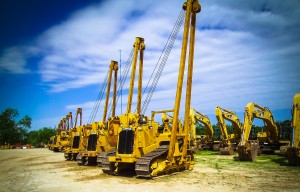By Julie Anderson
Oilfield equipment auctioneers hold forth on the ‘whys and wherefores’ of the auction trade.
There are certain words that conjure up both images and sounds, and “AUCTION” is definitely one of them.
First, you have a mental picture, or, rather, a comingling of two pictures: a man on a stand with a megaphone or a mic and a mouth that never stops moving, and an active audience filled with people and paddles raising and lowering in response to the man on the stand.
Second, you have the sounds. A rhythmic, repetitive chant with a quick cadence: “One dollar, now two, now two, will you give me two? Two dollars, now three, now three, will you give me three?” Some may even hear music, thanks to the 1956 hit song “The Auctioneer” by Leroy Van Dyke, or the 1995 hit single “Sold (The Grundy County Auction Incident)” by John Michael Montgomery.
These traditional auctions are still alive and well all over the country. However, the auctioneering world has grown and adapted to meet the needs of a high-tech, fast-paced world that relies on instant notification and broad dissemination thanks to the World Wide Web. For example, in today’s auction world, you may still have the man on the stand and the audience with the paddles. But in the center of the audience, you may find a table with laptops where bidders from all over the world are competing second by second and minute by minute with the live auction audience.
As the oil and gas industry has grown and spread, so has its presence in the actual and virtual auction yard.
Best of Both Worlds
Terry Dickerson, founder and president of Machinery Auctioneers, has respect for the old-school auctions, especially when it comes to the relational aspect. For example, regular patrons of his company, home-based in San Antonio with additional offices in Odessa and Alice, Texas, will telephone Dickerson or his brother, who works with him, to discuss a particular piece of equipment or a truck for sale. Machinery Auctioneers buys and sells all types of machinery, including oilfield equipment and trucks.
“You develop a trust,” shared Dickerson, who co-owns the family business with his wife, Andrea.
“We’re the ‘mom-and-pop’ auctioneer,” Dickerson joked. All levity aside, the Dickersons embraced the evolving nature of auctioneering and are all about the competition, both live and online.
“The good old U.S.A. is one of the most competitive countries in the world,” Dickerson declared. “Being able to have a crowd of bidders interested in one product, you are going to get the best price,” he maintained. “Mixing a live crowd with Internet bidders results in highly competitive bidding, which is the key to success for both the buyer and the seller.” At a recent auction in Alice, the audience included several hundred onsite registered buyers along with well over 100 online buyers from all over the United States and 12 different countries.
While Machinery Auctioneers has traditional oilfield equipment, Dickerson has found that trucks are a much-needed item among industry players.
“Without trucks to transport equipment, rigs, piping, casing, and the end products, you wouldn’t have an oilfield,” he emphasized. “In fact, there are more trucks used in the oil and gas industry than there are actual pieces of oilfield equipment!”
A Matter of Expediency
C.E. Vaughan, president of Equify Auctions, LLC, cites expediency as one of the top benefits of using an auction to buy and sell oil and gas equipment and assets. Equify Auctions is home-based in Wills Point, Texas, with another location under construction in Cisco and a third in the works in Sealy, located just outside of Houston on Interstate-10.
“There’s a sense of expediency when it comes to auctions,” Vaughan suggested, “where items sell quickly and oftentimes turn an idle asset into cash.”
The evolving nature of the traditional auction has afforded sellers worldwide exposure, he said. In fact, as of press time, Equify Auction’s most recent auction resulted in sales to bidders in Vietnam, the United Arab Emirates, and Lebanon.
The combination of what Vaughan calls an “auction gallery,” or a live audience, with a host of bidders from around the world “gives a sense of thrill to the live bidding” he stated. The Internet clerks at Equify Auctions are in the audience, connecting those in the gallery with their online competitors. For example, some auctions may include 500 in the gallery with another 400-500 on the Internet.
Auctioning is not necessarily associated with a “bargain,” Vaughan clarified. Rather, “the prices are fair. We set the values for the rest of the world to buy from.”
In another example of old-school auction settings incorporating technological advances, Equify Auctions offers color slide viewing of each auction item to help provide thorough information on the item during the decision-making process.
A Story to Follow
As an online auction service, EnergyNet gives the buyer “a story to follow,” as explained by Chris Atherton, president of EnergyNet, Inc., which facilitates the sale of producing working interests (operated and non-operated), overrides, royalties, mineral interests, and non-producing leaseholds, all using an Internet platform.
EnergyNet’s online auctioning process offers sellers “a platform to showcase data and a huge market exposure to buyers,” Atherton said.
From start to finish, the process takes about 30 days, from collection of preliminary data to the creation of a virtual data room, to the actual auction.
EnergyNet, based out of Amarillo, allows the seller to review the data room to ensure the information is accurate. Once they receive approval, EnergyNet “kicks marketing into high gear,” Atherton explained. He noted that the company begins contacting operators and buyers who have bid or bought similar properties in the past.
“We make sure that all of the right people know that the property is for sale so they can bid on it if they so choose,” he added.
The “story” told by EnergyNet on behalf of the sellers to potential buyers may include energy evaluations, maps indicating activity, and what Atherton terms “due diligence” materials.
EnergyNet does not provide an opinion on whether the asset is “good or bad,” but rather showcases the width and breadth of the asset, allowing the potential bidders to evaluate the asset and come up with an offer.
On the buying side of the coin, buyers who register with EnergyNet must be certified, sophisticated investors. In addition, they are apprised of regulations that protect the buyer and of any buying risks.
The online auction options include both competitive bidding, wherein the bids are transparent, and sealed bidding, wherein bidders must submit by a particular date but are not able to see what other buyers are contemplating.
Why Not Do It Yourself?
“Many people attempt to buy and sell their own properties,” Atherton offered.
“It’s kind of like giving yourself your own haircut,” he said. “You can do it, but it may not turn out as well as you planned.”
Of course, there is a cost associated with utilizing an auction service. The commission allotted to the auctioneer company. along with any associated fees, is dependent upon the scope of services, size of the item, and other factors. Both buyer and seller can assess this cost before committing to the auction process.
When it comes to buying and selling oil and gas assets and equipment via a live or online auction, the following general benefits may be worth consideration.
1. Many auctioneers offer a full range of services including transportation of items, repairs, cleaning, detailing, etc. As Vaughan stated, in some cases “just a good steam cleaning” will make an item more attractive.
2. Auctioneering companies are able to conduct comprehensive marketing efforts including global digital media campaigns and the use of email blasts to place properties or equipment into a global marketplace. On a related note, auctioneer companies and services prioritize matching buyers and sellers. Companies collect information from both parties and put the right assets or equipment in front of interested buyers.
3. As indicated by Dickerson, auctioneers can ensure that the buyers are “qualified buyers.” On the buying side, first-time buyers may be required to provide a deposit or a bank letter of guarantee for either a personal or company check. Cashier’s checks may also require verification. These regulations provide comfort to the seller when it comes to payment processing.
4. Sellers may be able to set a minimum price and have final say on a sale.
5. Many auction companies have the resources and technology to connect live audiences with global audiences via an Internet platform, offering a truly competitive setting in a particular time frame. Oftentimes, in a private sale a buyer later learns his particular asset was worth much more than he thought. Or, the seller may set an unrealistic price and waste time waiting for buyers who never emerge.
6. Auctioneers are licensed by the Texas Department of Licensing and Regulation (TDLR), which includes an enforcement division. An auctioneer must meet the following qualifications:
- be at least 18 years of age;
- be a citizen of the United States or a legal alien;
- hold a high school diploma or a high school equivalency certificate;
- not have been convicted of a felony within five years of the application date;
- complete 80 hours of classroom instruction at an Auction school approved by TDLR; and
- pass an auctioneer licensing examination.
- Each auctioneer is required to complete six hours of continuing education to renew his/her annual license, including two hours of instruction covering the laws and rules that regulate conduct.
- All persons licensed by TDLR can be located in TDLR’s licensing database.
7. Most auctioneering companies are also bonded and insured in the interest of providing safe and reliable transactions. Buyers and sellers can verify this information prior to committing.
If You Aren’t Sure, Just Ask
Auctions can be fast and furious, requiring buyers and sellers to make quick decisions and meet hard-and-fast deadlines. However, when it comes to the decision of whether or not to buy and sell privately versus using an auction, there’s no giant rush. Examine companies. Ask for referrals. Talk to other industry professionals and ask them why they chose to buy or sell via auction. If you do decide to buy via auction, investigate the product before bidding begins. Where did it come from? How was it used? If the product is property, make sure background information and reports are readily available. If you can’t find a particular study, i.e. an engineering study you deem important, contact the auctioneer or company and see if one is available.
“Don’t be afraid to ask,” Dickerson insisted. “Know the process. Do the research.”
After all, the auctioneer knows if buyers and sellers do not leave satisfied, they won’t come back.
Julie Anderson, based in Odessa, is editor of County Progress Magazine, and is well known to many readers of PBOG as the former editor of this magazine.













